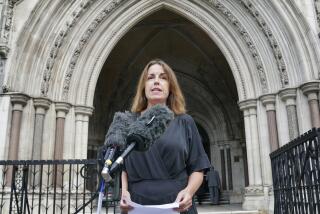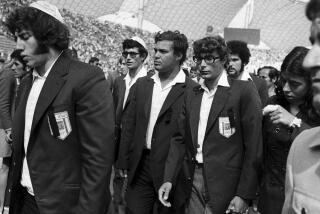De Klerk Will Probe Alleged Police Hit Squads : South Africa: Political foes reportedly were targeted. The inquiry is a victory for human rights groups.
- Share via
JOHANNESBURG, South Africa — President Frederik W. de Klerk, heeding the persistent demands of human rights groups, announced Wednesday night that he is appointing a judicial commission of inquiry into allegations that formal police hit squads have over the past 10 years assassinated political opponents of the South African government.
The president’s decision was a victory for human rights organizations, which have been pushing since November for an independent investigation into assertions by two former police officers that the hit squads existed and operated under the command of generals in the South African police.
In revealing De Klerk’s decision, Justice Minister Kobie Coetsee said the president “indicated that these matters should be completely exposed.” The announcement came on the eve of a protest march that had been planned for tonight in Cape Town to demand a judicial inquiry into hit squad claims.
De Klerk had previously refused to open an independent inquiry, saying the matter could be handled more quickly and efficiently by police investigators.
The justice minister contended that the government had made progress in its investigation of alleged hit squads. He noted, for instance, that murder charges have been filed against Almond Nofomela, a black former policeman on Death Row for an unrelated murder conviction. In detailed affidavits filed hours before his scheduled execution in November, Nofomela admitted being part of a formal police hit squad that killed at least eight anti-apartheid activists, including Durban lawyer Griffiths Mxenge, who was abducted and stabbed to death nine years ago.
Nofomela’s execution has been postponed, pending an investigation into his allegations. His statements were supported by another former policeman, Capt. Dirk Johannes Coetzee, who admitted being the officer in charge of Nofomela’s squad. Coetzee, who is white, has since fled the country. Another black member of the unit, David Tshikalange, also confirmed Nofomela’s account before leaving the country.
De Klerk appointed Judge L.T.C. Harms to conduct the inquiry “to afford a further opportunity for evidence, information and investigation” into alleged murders and other acts of violence designed “to achieve, effect or promote political aims,” according to Justice Minister Coetsee.
The announcement “shows that ordinary, concerned South Africans can have an influence on government decisions if they display the courage of their convictions and act upon them,” a spokesman for the Campaign for a Judicial Inquiry for Hit Squads said Wednesday night. In light of the government’s decision, the group said, it was canceling today’s protest march.
The liberal white Democratic Party welcomed the president’s decision.
“This is what we and virtually every newspaper in the country have been calling for over the last two months,” said Denis Worrall, co-leader of the party. He added that the hit squad allegations “go to the heart of South African statehood and government morality.”
More than 100 anti-government activists have been murdered in the last 15 years, about half of them inside South Africa, according to human rights groups. Among the victims in South Africa have been Mxenge in 1981; his wife, Victoria, in 1985, and anthropologist David Webster in 1989. Dozens of other activists have disappeared, many after being taken into custody by authorities. In only two cases has anyone been charged.
The government has usually attributed such killings to internal conflict in the outlawed African National Congress or shadowy groups of white supremacists.
But Capt. Coetzee, in published interviews in November with a local Afrikaans-language weekly, admitted that he directed a team of black policemen, known as the “A-Team,” who worked from a secret headquarters near Pretoria. They abducted African National Congress operatives and, during hours of interrogation, attempted to “turn” them into anti-terrorist police officers, Coetzee said.
On occasion, Coetzee said, he received orders from senior police officers in Pretoria to carry out assassinations.
“My men and I killed and eliminated political enemies of the government,” Coetzee said, according to the published reports. “I never hesitated to carry out an order. I thought, ‘There are people who want to take this land, and they must be killed.’ ”
Police have acknowledged the existence of the anti-terrorism unit but deny it was ever used to assassinate government opponents.
More to Read
Sign up for Essential California
The most important California stories and recommendations in your inbox every morning.
You may occasionally receive promotional content from the Los Angeles Times.











